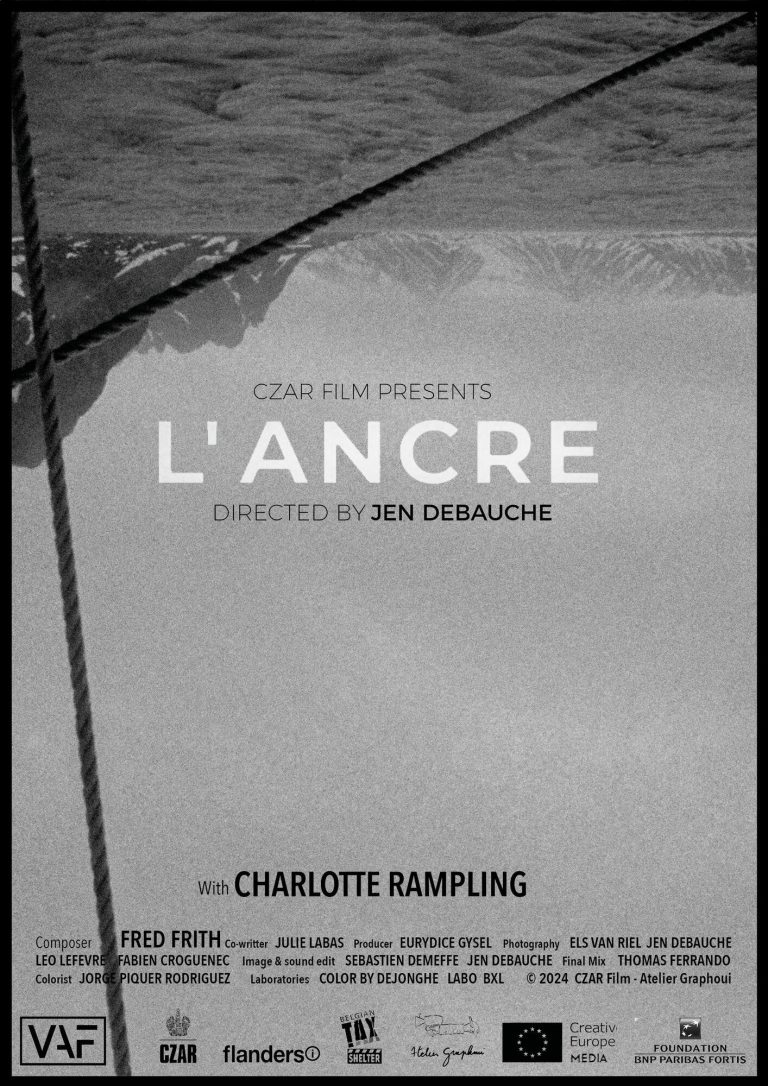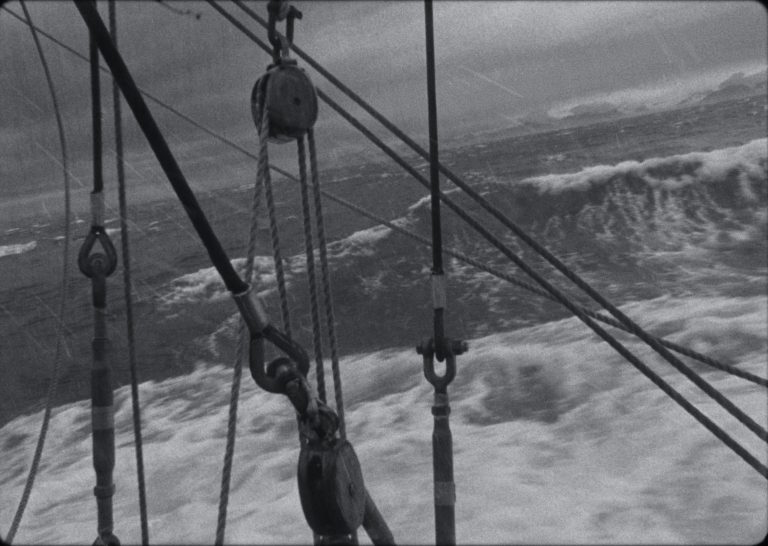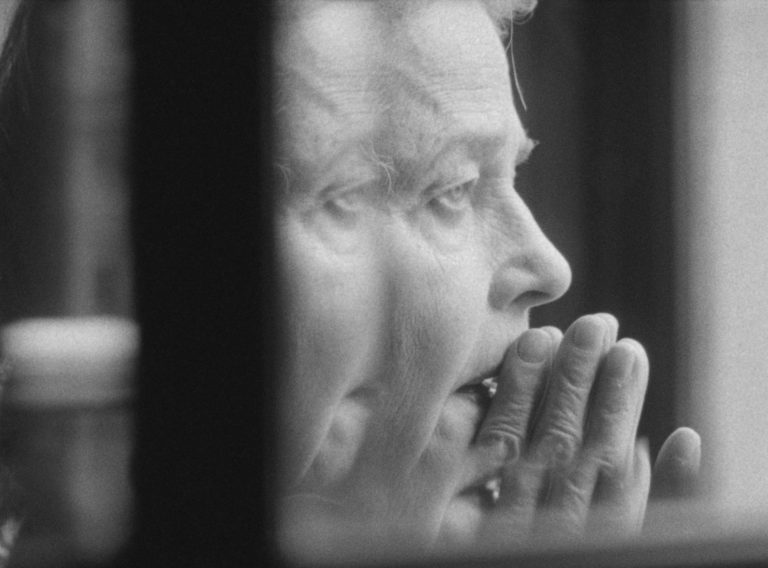A drifting boat, fragile voices, melting ice—
Jen Debauche’s newest feature film, The Anchor, offers a poetic and experimental meditation on psychosis. With haunting visuals, an immersive soundtrack and personal testimonies, the Belgian director invites the viewer to not only hear the complexities of the mind but to listen in deeply. In crafting this narrative, Debauche reclaims the voices of those often left unheard, emphasizing profound human experience over stigma and distortion.
According to the French philosopher Michel Foucault, madness is defined externally—by society—and exists only in relation to its social constructs. In the unpublished artistic research on madness (which she generously shared after our discussion – read here), central to the development of her latest film The Anchor (original title L’Ancre), Jen Debauche references this definition of the concept. Madness, for Foucault, signifies a loss of reason, a violation of social norms, and a stance that is marginal, deviant, or nonconformist, the opposite of wisdom. While “psychosis” has gradually replaced “madness” to describe a range of severe mental disorders—marked by symptoms such as a distorted sense of reality, disintegration of personality, hallucinations, delusions, and cognitive disconnection—it remains widely misunderstood, largely due to its misrepresentation in the media. Films and cinema, often a primary source of public interaction with mental disorders, play a significant role in this process, typically portraying mental illness in exaggerated or stigmatizing ways that emphasize the “otherness” of affected individuals.

Where cinematic depictions of psychosis have historically relied on violent stereotypes—as exemplified by Alfred Hitchcock’s Psycho (1960), which helped cement the link between schizophrenia and danger—The Anchor goes against the grain. It is Debauche’s second feature, which had its world premiere at Lisbon’s most important documentary film festival Doclisboa, immediately earning critical acclaim and winning two awards: the CUPRA International Competition Jury Award and the TVCine Channels New Talent Award. The film offers a fusion of theory, practice, and personal accounts, coming together into a hauntingly poetic meditation on psychosis. Shot in black and white and edited in a lab using analog processing techniques by the director herself, The Anchor blends personal testimonies, desolate landscapes, and visual experimentation, featuring footage from a journey to the Arctic, blurring the lines between fiction, documentary, and experimental cinema.
“The vast and icy wilderness changes in response to external forces, and so do the personal narratives of the characters as they navigate through their experiences of psychosis”
In the intimate setting of her office, a psychotherapist, portrayed by the iconic Charlotte Rampling—the only physical presence in the movie—retrieves old cassettes, listens to and narrates the accounts of her patients describing their experiences of psychosis. The characters—Ailyn, Bruno, and Gilles—are developed solely through audio, their presence made tangible in their stories, as the images shift from the confined, personal space of the office to the expansive setting of a boat drifting through the Arctic. This choice in storytelling wittingly subverts the voyeuristic character of cinematic representations of mental disorders, giving the agency back to the subjects and forcing the viewer to shift perception and actively listen. An eerie, minimalist and experimental score enhances the film’s emotional resonance, amplifying the mood and underscoring the interplay between what is revealed through sound and what unfolds visually. Descriptions of mental and emotional turmoil experienced by the patients are paired with mesmerizing shots of isolated and secluded landscapes, otherworldly images of underwater creatures, layers of crystal-clear ice melting away, textured and bubbly, surrounded by vastness and serenity of the water.

Invoking sensations of the sublime, this choice of visual representation creates links between disruptions in the human psyche and the ecological disruptions caused by global warming. The vast and icy wilderness changes in response to external forces, and so do the personal narratives of the characters as they navigate through their experiences of psychosis. This connection underlines the “madness” consuming the planet, drawing symbolic parallels between the fragility of the mind and the environment. Just as psychotic episodes transform one’s experience of existence, melting glaciers transform the world as we know it.
“Stripped from an aura of danger and violence, each character’s story presents a distinct vantage point to the understanding of [the experience of psychosis]”
Jen Debauche manages to balance a complex and well-researched look at the experience of psychosis with a unique aesthetic approach, presenting a sensitive and compassionate portrayal of a hugely misunderstood and stigmatized human experience. Stripped from an aura of danger and violence, each character’s story presents a distinct vantage point to the understanding of this complex issue, as well as subtle commentary on psychiatric institutions—from mistreatment and forced medicalization to peaceful surrender to mental health professionals—culminating in a touching twist.

“Ask yourself what it is for, and not why it happened”, one of the characters hears from his therapist. The Anchor not only shifts the perspective on the subjective experience, it also encourages deeper reflection on what mental disorders can mean and what transformative potential they carry. It welcomes on a healing journey, providing space for the personal and vulnerable, simultaneously framing psychosis within the larger context of societal norms and constructs, inspiring its redefinition with greater understanding and empathy.
We use cookies to make sure you get the best out of our presence, and by using our website, you agree to our use of cookies. For more information, read our Policies or reach out to us by email.